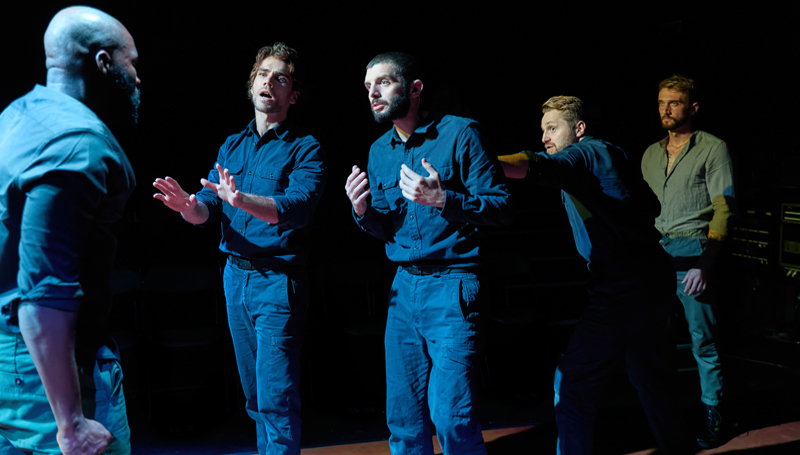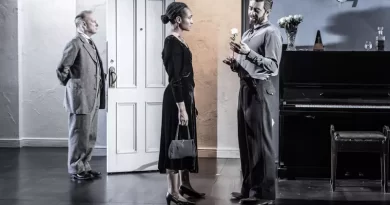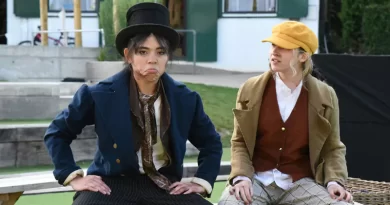“Othello” at Riverside Studios
Jeremy Malies in west London
9 October 2023
“I am not what I am …” Iago tells us in an early soliloquy. That’s an understatement for Sinéad Rushe’s production of Othello in which three actors – Michael C. Fox, Orlando James, and Jeremy Neumark Jones – all play Iago with the lines shared around and the actors always present together on stage. Does it work? The stronger your Iago the more difficult it is for your Othello is the received wisdom. So, Martins Imhangbe as the Moor might be challenged. Except he isn’t because the trio playing Othello are the weakest actors in what is otherwise an impressive cast.
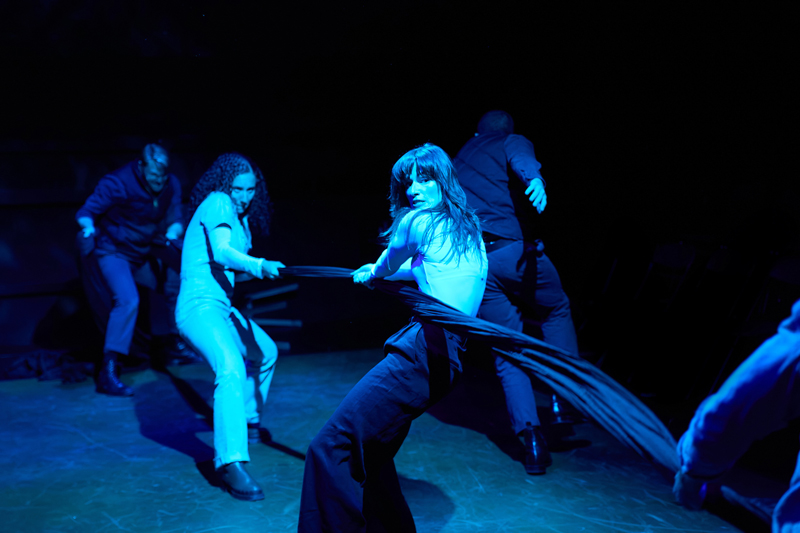
The company.
Photo credit: Mark Douet.
A modern-day criticism of the play, often voiced by young people, is that race is not enough now to establish Othello as an outsider. It’s difficult to believe that in this current setting, all three iterations of Iago would immediately dismiss their commander on grounds of ethnicity, particularly (as I intuited) if the actors represent different strands of his personality. Rushe could usefully have stressed the ample evidence in the text that Othello is also a social outsider as the three Iagos whip up prejudices.
There may be subtleties in the treatment of Iago that I missed and which would make the production coalesce fully. But since I found just about every other aspect of the evening logical, seductive, and at times thrilling then no matter.
There were a few nerves on press night (only 20 tickets available to the general public) which could hardly have been helped by ushers who permitted a critic in one of the front rows (it’s a thrust configuration) to flourish a notebook the size of a billboard while also catching much of the shared light. I don’t think I could have continued as an actor amid all this.
So, it was unsurprising perhaps that Imhangbe took a while to find the pulse of the metre and he made little impact with his first huge speech in which he describes how narrating his war exploits in a poetic manner has won over both Desdemona and her father. But he soon settles, gels with Desdemona (Rose Riley), and is outstanding in the shorter dialogue where he exchanges ideas with his wife about their joint future.
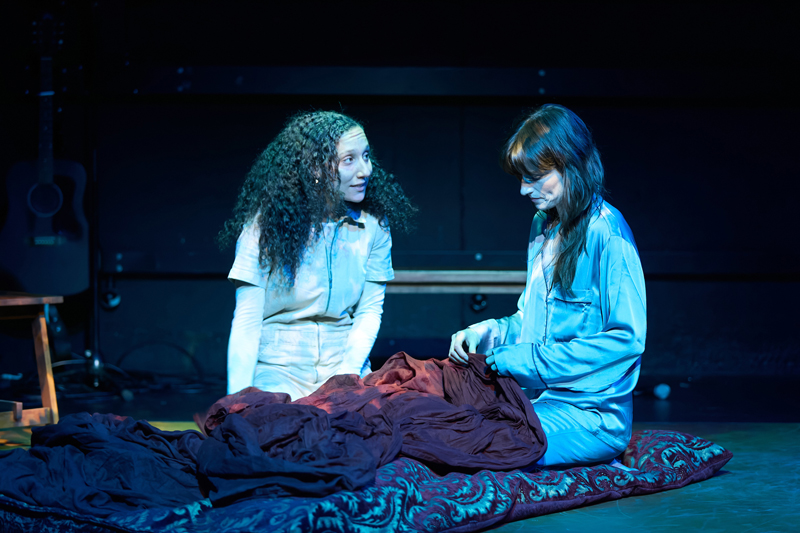
Rachel-Leah Hosker and Rose Riley.
Photo credit: Mark Douet.
Rushe’s career has seen her work across nearly every aspect of theatrical performance and there is a balletic quality to much of this. Her approach here is to strip out anything that is not vital in progressing the plot which seems to develop of its own volition. There is barely any stage to speak of, just an uncluttered performance space in front of us with few props. The cast conjures up the wreck of a Turkish ship (or perhaps the success of a Venetian one) with Imhangbe dragging a microphone along the floor to suggest waves (sound by Ali Taie) while colleagues manipulate a trestle table for the sound of heaving timbers. It works and could almost be Brechtian but for some of the music composed by Michael C. Fox (yes, that’s one of the Iagos) being produced live but out of our sight.
In line with the lack of props, Rushe uses only broad strokes to show that this is a military society. Costumes (by Natalie Pryce) are little more than combat boots with a bit of khaki, and we see few weapons. There can be no clunking aphorisms in something as streamlined as this so the memorable line “Keep up your bright swords, for the dew will rust them” must go. Performing this in a cultural vacuum focuses us on primal matters such as the alpha male struggles in and around the barrack room.
Rose Riley as Desdemona is first-rate. Even at moments of heightened emotion, her elfin figure remains predominantly still, making her few gestures land a punch in terms of conveying devotion to Othello but also the steely edge that has allowed her to defy her father and social norms when choosing a partner. She frequently steals on stage silently with an ethereal aspect, and we realize that this is Othello seeing her in his mind’s eye.
Riley almost shows her cogs whirring as Emilia (Rachel-Leah Hosker) explains that she herself would be willing to commit adultery just once if it would allow her husband to inherit the world. Never have I both loathed and empathized with Othello after the murder as he likens himself to somebody who “threw a pearl away / Richer than all his tribe …” Riley’s Willow Song to Fox’s music (simple folk guitar accompaniment) goes beyond the usual plaintive effect to be transfixing and transporting at the same time. Earlier, she has danced like a dervish as if hypnotized.
As Cassio, Ryan O’Doherty acquires detail unobtrusively and makes a supreme entrance after the brawl in which he is supposed to have been killed. He mocks Iago in a way that is pleasing as we realize that the conspiracy is unravelling and some small measure of justice will be served. There is fine detail as Cassio wavers between avoiding a hangover and appearing a wimp in the drinking stakes during the singing of a lewd ballad that is so obscene it will not respond to a Google search.
So what do the three Iagos lack and are they perhaps enfeebled by having only a third of the lines each to deliver? Even Michael C. Fox (Downton Abbey) fails to disgust us with his share of the hundreds of sexual puns (they do run to hundreds and Nicholas Hytner once counted them) while Jeremy Neumark Jones is like a footballer who can’t quite join the huddle with his teammates after a goal is scored. The three are often physically close but, being deprived of the lines that suggest real psychosis, Neumark Jones makes little impact. Even the linguistically astute Rushe (she often translates the foreign-language works that she directs) can’t divide up the soliloquies. Orlando James is given some of the most martial lines but fails to convince as a professional soldier.
The production is 100 minutes without an interval. Only as I realized that the street attack on Cassio lay between me and the final scene was I conscious of time passing but this was fleeting given the brilliance of the fight direction by Yarit Dor. A head-butt administered to Cassio (in the pure style of a Glasgow kiss) made me recoil in the fourth row.
It’s quite something to transcend the weakness of the split antagonists but this production is a success overall. With the amount of doubling-up in the cast and the minimal scenery and trappings, the piece could travel widely to almost any venue and I hope it tours.

